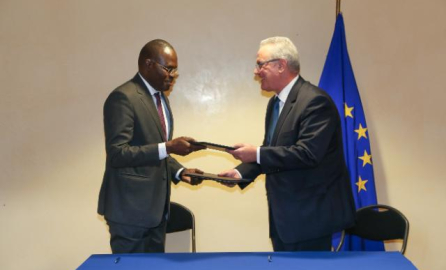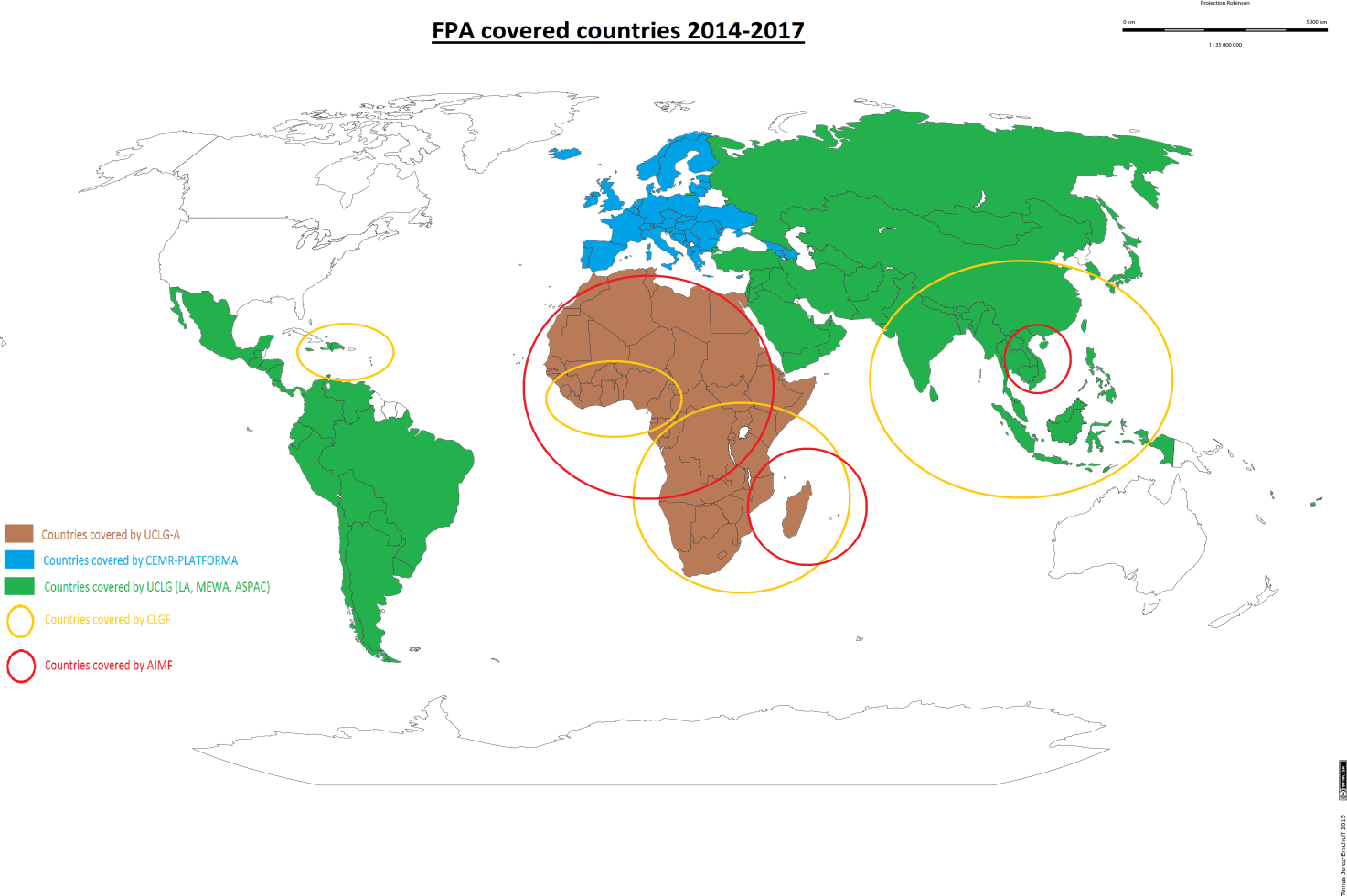“Although development is a global [issue], the implementation is always local. Because it’s at this level that it is most effective,” said Mr Khalifa Sall, President of United Cities and Local Governments and Mayor of Dakar. He believes that including local authorities in sustainable development is only ‘natural’. So what does it take to unite the European Commission and Local Authorities?
In January 2015, Neven Mimica, the Commissioner for International Cooperation and Development (DEVCO) signed a Framework Partnership Agreement (FPA) to form strategic partnerships with five Associations of Local Authorities (ALA):
“In some countries, the link to development processes may require larger capacities and stronger local governance structures. […] We want to help unlock [Local Authorities] full development potential as the public institution closest to citizens,” said Commissioner Mimica. He believes that “Strategic Partnerships create an institutional space for policy dialogue based on shared interests and common objectives. They must deliver real and concrete results.”
| In this video, Elena Asciutti, former colleague from DEVCO Unit B2 – Civil society, Local Authorities, explains how this FPA came about and how it could be re-used in other areas of development. Ms Asciutti now works for DG NEAR in the EU Delegation to Lebanon. |
The strategic partnerships will each last six years – up to the end of 2020 – with a budget of just over 20 million euros for the period 2015-2017, allocated under the Thematic Programme "Civil Society and Local Authorities". Work will be carried out on two levels: regional and continental with the following five signatories
- United Cities and Local Governments – World Secretariat (UCLG): they represent over half of the world’s total population through their Local Authority (LA) members, present in 140 countries. They are the united voice and global advocate for democratic local self-government.
- The International Association of Francophone Mayors (AIMF): AIMF's mission is to improve LAs' capacities as well as to foster exchanges of experiences and expertise among francophone LAs.
- Commonwealth Local Government Forum (CLGF): they promote and strengthen effective democratic local government throughout the Commonwealth.
- United Cities and Local Governments (UCLG-A): they work to advocate for the adoption and implementation of decentralisation policies in African countries.
- The Council of European Municipalities and Regions (CEMR) and PLATAFORMA promote the respect for the principle of subsidiarity and the participation of citizens in the European integration process, as well as coordinating the voice of European local and regional authorities in the field of development cooperation.
“It’s going to improve the work that we have been carrying out. It’s going to assist us in even going deeper and deeper in our aims and goals,” said Dr Lazaros Steliou Savvides, CLGF Board Member and Mayor of Strovolos. “So I’m very delighted that we have signed this particular agreement.”
In the video below, several of the signatory ALAs share their thoughts on the partnership and how it will help them to implement the post-2015 agenda.
Moving forward, this partnership will be crucial in achieving the Sustainable Development Goals (SDGs). Central governments will not be able to achieve these targets on their own; local needs also need to be taken into account.
Although LAs have recently emerged as important development actors, their involvement in development processes is still a work in progress. They are in a unique position to link local concerns and priorities to national, regional and international debates. Yet they still face significant constraints to their effective contribution to good governance and inclusive development, as well as to provide their members with adequate services. This is, among other things, due to the lack of an adequate level of institutional and organisational capacities as well as human and financial resources.
In 2013 the European Commission (EC) Communication Empowering Local Authorities in partner countries for better governance and more efficient development outcomes [Communication 280 (2013)] identified the priorities for supporting Local Authorities in partner countries:
- Support to Decentralisation Process
- Capacity Development of Local Authorities
- Sustainable urbanisation
- Reinforcement of Association of Local Authorities.
This FPA takes things one step further, looking at implementation of development policies and long-term strategies:
“It will tie up the [links] between the EC and our networks,” said Frédéric Vallier, Secretary General of CEMR, speaking about the partnership. But “now it’s time to implement. And this partnership is all about that. How are we going to implement?” Strategic Partnerships and the related grants should create renewed awareness on the need to focus on territorial dimension of development. From a political point of view, they will offer a more stable collaboration with ALAs as well as higher technical standards. In operational terms, they will allow a long-term view focusing on the achievement of strategic priorities and political objectives as defined in their own mission statements and multi-annual strategies.
They will also further promote dynamic bottom-up and long-term development processes based on multi-actor and multi-sector approaches.
But will they be successful?
The EC and the ALAs set ambitious objectives in these partnerships, including:
- support to LAs in partner countries on capacity gaps;
- equal access to power for men and women;
- decision-making and accountable leadership at the local level;
- and improved service delivery.
LAs are also expected to play a more important role
- in defining and implementing national public policies;
- in responding to rapid urbanisation process;
- and in responding to crisis situations.
In order to measure the progress towards these objectives, the EC created a Monitoring and Evaluation Mechanism (MEM). The monitoring will ensure coherence, promote knowledge exchange among FPA beneficiaries and when necessary suggest mitigation solutions. While the evaluation will evaluate the ALAs performance against the objectives defined in the partnership agreement.
Although the EC has been using FPAs for several years, this was the first time one was used by DEVCO. This is just the first step: DEVCO is currently working on a guidance note and revising the FPA templates, so that this new cooperation modality can be re-used by the European Union Delegations and other DEVCO services.
For more information on how ALAs work and how the FPA will be implemented please click on the links below which will reveal more information on the details behind this new instrument.
|
|||||||||||||||||||||||||
For more information on the work that the EC carries out with Civil Society, LAs and on their decentralisation policies, you can visit the following groups:
- Public Group on Civil Society where you can also view the speeches that Anne Hidalgo, Mayor of Paris, and Annemarie Jorritsma-Lebbink, Mayor of Almere, gave at the signing event on behalf of the AIMF and CEMR, respectively.
- What is next for on-going projects (CSO-LA Programme’s Seminars)?
- Policy Forum on Development
- Public Sector Reform & Decentralisation
This collaborative piece was drafted by Elena Asciutti with support from the capacity4dev.eu Coordination Team.


Log in with your EU Login account to post or comment on the platform.
It is great to unite the work of European Commission and local authorities. The challenges however lie on how to make strategic partnerships inclusive. In many African countries Mayors are appointed and local authorities are based on party lines and "toe the line" principle and the principle that the council should be based on tribal majority that is people of a particular place must be the majority in a council even if the city or town is hugely cosmopolitan.
The level of collaboration and partnerships between local authorities and councils is marred by suspicion and conflicts based on the fact that civil society organizations are grouped wrongfully under political opposition rather than development facilitators or the bridge between local governments and various sub-populations.
The EU commission may have to develop an effective strategy of working with individuals and some skill-based civil society organizations in such partnerships it creates with local authorities in order to be holistic inclusive and proactive to the actual needs of the people. This is not to say local authorities cannot deliver in themselves but it is to ensure that delivery is not politicized or based on totally tribal underpinnings even though cultural inclusion in project designs must be put in focus.